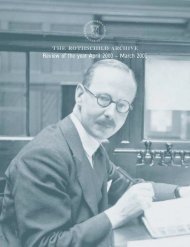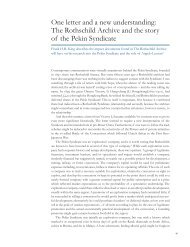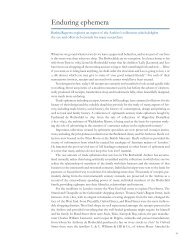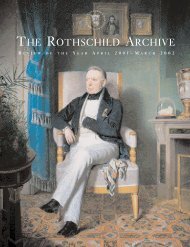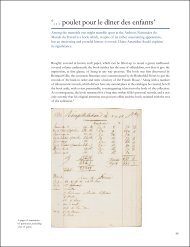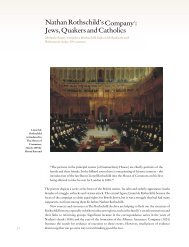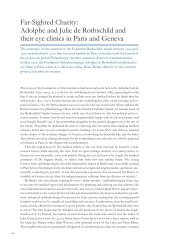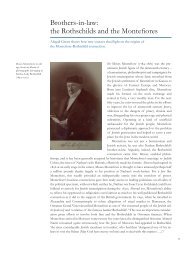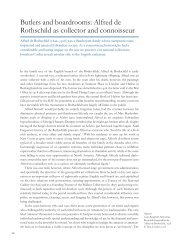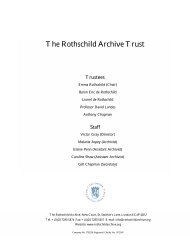66900 Rothschild Archive - The Rothschild Archive.
66900 Rothschild Archive - The Rothschild Archive.
66900 Rothschild Archive - The Rothschild Archive.
You also want an ePaper? Increase the reach of your titles
YUMPU automatically turns print PDFs into web optimized ePapers that Google loves.
40<br />
writings by the demonisation of certain groups or individuals who were held to represent it.<br />
Prominent among these demons, and standing at the apex of the bourgeois world, were the fabulously<br />
wealthy <strong>Rothschild</strong>s, or more specifically James. Herzen makes explicit disparaging references<br />
to the family both in a published ‘letter’ of 1847 that later formed part of his Letters from<br />
France and Italy (v, 35, 61) and in From the Other Shore (vi, 28).<br />
Notwithstanding this public disdain for the <strong>Rothschild</strong>s, Herzen was already privately<br />
availing himself of their services in February 1848, when he turned to the Italian branch of the<br />
House following the theft of a briefcase that contained important financial documents during<br />
a visit to Naples (v, 114–115; xxiii, 62–65). <strong>The</strong> relationship with the House continued when<br />
Herzen returned to Paris. As is evident from letters to the man who was overseeing Herzen’s<br />
affairs in Russia during his absence, Grigorii Kliuchariov, in April 1848 Herzen was in touch<br />
with James de <strong>Rothschild</strong> about a bill of exchange that had been sent to him from Moscow and,<br />
by the second half of the following year, was in ‘constant contact’ with him ‘about shares and<br />
various matters’ (xxiii, 71, 73, 164, 209).<br />
From Herzen’s correspondence, especially his previously unknown letters to and from<br />
James de <strong>Rothschild</strong> as well as his letters to Kliuchariov, it is possible to build up a detailed picture<br />
of Herzen’s financial affairs and of the services that <strong>Rothschild</strong>s rendered to Herzen and<br />
his family in the early years of their emigration. For one thing, the bank was a reliable conduit<br />
for mail addressed to the itinerant political refugee. It was also a source of guidance on practical<br />
matters, besides purely financial matters, in the foreign world in which the Herzens now<br />
found themselves. For example, in June 1849, when Herzen had fled to Geneva, he confidently<br />
expected the House not only to take care of his share certificates in his absence but even to<br />
advise Natalie about difficulties that might arise during her journey to Switzerland to join him<br />
as a result of the fact that the family’s passport was in his name (xxiii, 148). Herzen also tried<br />
from time to time to exploit <strong>Rothschild</strong>’s social and political influence. Thus in May 1852, when<br />
he wished to return to Paris from Nice (which was not at that time within French territory), he<br />
wondered whether <strong>Rothschild</strong> might be able to intercede on his behalf (xxiv, 274). Most importantly,<br />
though, Herzen constantly consulted the bank about his family’s financial affairs or, when<br />
he was not in Paris, urged Natalie or his friends and various informal aides to consult it about<br />
them. Indeed he seems from the spring of 1848 to have been wholly dependent on James, and<br />
one of his assistants, Schaumbourg, about whom he spoke with respect and a certain fondness,<br />
for the management of his family’s resources. <strong>The</strong> financial services from which Herzen benefited,<br />
besides the routine service of maintaining his accounts, changing bills of exchange and<br />
keeping his financial papers, included continual advice on investment of his assets, brokerage,<br />
and – as it became clear that Herzen would not return to Russia – recovery of as much of the<br />
family’s wealth as possible from his homeland.<br />
It should be said at this point that by the time he arrived in the West Herzen was a very<br />
wealthy man. In 1841 he had received from his father, by a deed of transfer of ownership, a<br />
sizable estate, with over two hundred male serfs, in Kostroma Province, to the north-east of<br />
Moscow. When his father died, on 6 May 1846 (OS), Herzen inherited one-third of his capital,<br />
amounting to 106,000 silver roubles, ₆ as did his elder half-brother, Egor (1803–1882), and his<br />
mother, Luise Haag. He also enjoyed substantial income, in the region of 10,000 roubles a year<br />
as a rule (xxiii, 99), from his capital and estate, on which his serfs paid quit-rent. As for his<br />
mother’s assets, they included 60,000 paper roubles and a bond worth 17,500 silver roubles as<br />
well as her share of Herzen’s deceased father’s capital (xxiii, 62–63). <strong>The</strong> combined capital of<br />
mother and son at the time when James began to handle their financial affairs was in the region<br />
of 300,000 silver roubles, or well over a million French francs at the then rate of exchange, in<br />
addition to the Kostroma estate and two houses in Moscow.⁷<br />
In 1847, during his first year in the West, Herzen’s main financial concerns were to keep<br />
abreast of the management of his assets in Russia and to arrange for the transfer of sufficient



